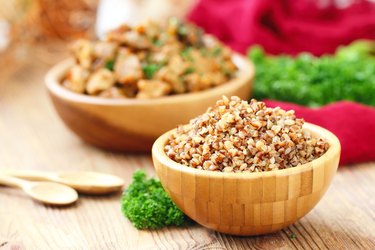
If you're looking for delicious ways to improve your health and your weight, start making whole grains a priority in your diet.
While whole wheat, brown rice and oatmeal all make good choices, venturing out and trying a new grain — such as buckwheat — can open up a whole new culinary world. Buckwheat is a small, triangle-shaped grain used to make soba noodles, blintzes and pancakes. It also makes a good pilaf or tabbouleh.
Video of the Day
Video of the Day
Buckwheat is a healthy carb and a good source of fiber and magnesium.
Cooked Buckwheat Nutrition Facts
A half-cup of cooked buckwheat contains:
- 77 calories
- 0.5 g fat
- 0 mg sodium
- 16.7 g carbs
- 2.3 g fiber
- 0.8 g sugar
- 2.8 g protein
Raw Buckwheat Groats Nutrition Facts
A half-cup of raw buckwheat groats contains:
- 300 calories
- 2 g fat
- 0 mg sodium
- 56 g carbs
- 2 g fiber
- 0 g sugar
- 12 g protein
Is Buckwheat High in Carbs?
As an unprocessed grain, buckwheat groats are a healthy source of carbohydrates. In fact, 80 percent of its calories come from carbs, per the USDA.
Your body uses the carbs in foods like buckwheat as a source of energy to support normal body function and physical activity, according to the U.S. National Library of Medicine (NLM). Buckwheat also contains fiber, a type of carb, that can help you feel full, less likely to overeat and regulate digestion.
It Contains Protein and Is Very Low in Fat
A 1/2 cup serving of cooked buckwheat groats contains nearly 3 grams of protein. What's more, unlike many other sources of plant-based protein, buckwheat is a complete protein, containing all nine essential amino acids, according to the Whole Grains Council.
Buckwheat is also very low in fat, with a half gram of total fat in a 1/2 cup cooked serving. However, cooking it with oil or butter can add fat.
It's a Source of Vitamins and Minerals
Buckwheat contains a number of essential vitamins and minerals your body needs for good health, including B vitamins, magnesium, copper and zinc.
The B complex is a group of eight vitamins that help turn the food you eat into energy, per the NLM. Magnesium maintains nerve and muscle function and supports a healthy immune system, according to the NLM.
Copper supports the blood vessels, nerves, immune system and bones while zinc supports a healthy immune system.
- Whole Grains Council: Buckwheat
- Centers for Disease Control and Prevention: Low-Energy-Dense Foods and Weight Management: Cutting Calories While Controlling Hunger
- Harvard School of Public Health: Carbohydrates
- MedlinePlus: B Vitamins
- MedlinePlus: Folic Acid
- USDA: "Roasted Buckwheat"
- USDA: "Raw Buckwheat Groats"
- U.S. National Library of Medicine: "Carbohydrates"